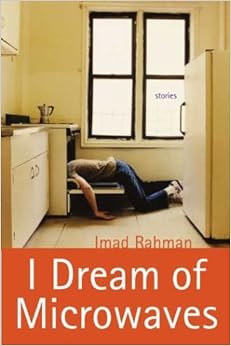This book was recommended to me by a computer program. I'm not necessarily leery of books recommended by computer, though I am yet to find a program that is terribly satisfactory. What I mean is that, for example, on Amazon, if I say I like The Great Gatsby, then the program makes the incredible leap that I might also be interested in other works by Fitzgerald. That's kind of a no brainer and not something I need a computer program to tell me. I'm more interested in a computer telling me about work I might not otherwise notice--works such as this one.
Because I was coming to Rahman's work blind, I didn't know what I was in for. I knew he was Pakistani American, and I knew that these were short stories. I didn't know that all eight stories were linked, building on one another in a way that didn't seem repetitive, that seemed more of a whole than some other linked collections I've read, yet not trying to foist itself off as a badly paced novel either (i.e., each story really does read as a story on its own).
Rahman's central protagonist is a largely unsuccessful Pakistani American actor, whose most famous work involves roles as criminals in reenactments on America's Most Wanted. Don't look for prose that's somber and dredgelike here, though. Rahman's writing is vibrant, full of life, crazy, absurd. I see the influence of Padgett Powell (with whom I believe he studied, based on his acknowledgments) and by extension of Joseph Heller. Rahman is part of that absurdist school. Such writing at times can grate on me, for I generally prefer more realistic work, dialogue that isn't so clever (in one story, all of a particular character's lines are taken from movies), but when it's done well, as it often is here, and as Heller does best in Catch-22, such writing can make one want to step out into the day and join the birds in song.
The absurdity works well for Rahman in part because of what he seems to be aiming to present, which is a breakdown of what identity is, of who we are really. The actor, the man who perennielly poses as someone else for a living, is what underneath? And what, by extension, is this thing we call an American citizen? Kareem Abdul Jabbar, the narrator of Rahman's stories, is mistaken at various times for a Mexican or for the criminals he plays--and is typically rejected as "inauthentic" when he's asked to play transcendentalist-type Asians (and indeed, he may be Asian, but by no means is he transcendental). I do question Abdul's continuing ability to gain women--and lose them--with such ease; the constant focus on sex (or lack thereof) comes to seem a bit like machismo one sees in some less elegant Hispanic American writing (one story, where the sex is turned on its head, that works fairly successfully involves Abdul's renting out his ex-girlfriend's house to local porn artists).
Although I really enjoyed "Here Come the Dog People," a story about Abdul's in-between-gigs job as a dog walker, the story I liked most is "Call Me Manny" It comes near the end of the book and also seems to me the least gimmicky. It's a post-9/11 story in which Abdul, on the outs with a girl, ends up tag-teamed with a couple of down-and-outs, bored with their life, who are intent on finding Arab terrorists in Florida. Abdul poses as a Mexican actor who poses as an Arab in order to expose criminal elements in his new place of employment. Every stereotype is played up in this story and turned around in such a way that you can't help but feel a little sorry for all these people who have nothing better to do than stare at each other through the lens of popular television.
Sunday, February 1, 2009
On "I Dream of Microwaves" by Imad Rahman ****
Labels:
Books,
Collections,
Four-Star Collections,
Imad Rahman
Subscribe to:
Post Comments (Atom)







1 comment:
It was very nice reading you. Microwaves was recommended to me by a french critic in a newspaper. And I really enjoyed it. I wrote about it 2 weeks ago in my "phrase qui tue" collection.
I don't know Padgett Powell or Joseph Heller. I am going to check there names and maybe a computer program will recommend one text in particular...
Post a Comment